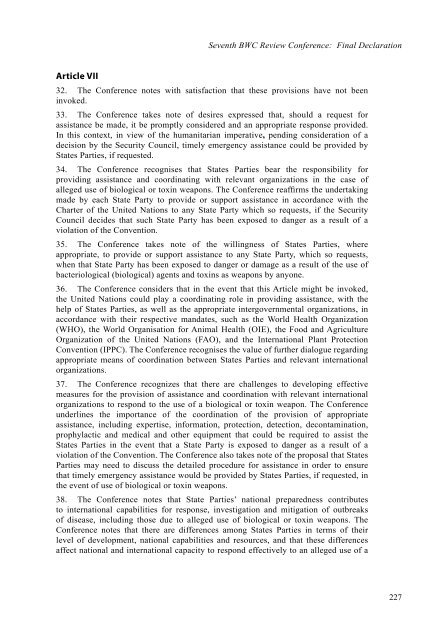DYB2011-Part-II-web
DYB2011-Part-II-web
DYB2011-Part-II-web
You also want an ePaper? Increase the reach of your titles
YUMPU automatically turns print PDFs into web optimized ePapers that Google loves.
Article V<strong>II</strong><br />
Seventh BWC Review Conference: Final Declaration<br />
32. The Conference notes with satisfaction that these provisions have not been<br />
invoked.<br />
33. The Conference takes note of desires expressed that, should a request for<br />
assistance be made, it be promptly considered and an appropriate response provided.<br />
In this context, in view of the humanitarian imperative, pending consideration of a<br />
decision by the Security Council, timely emergency assistance could be provided by<br />
States <strong>Part</strong>ies, if requested.<br />
34. The Conference recognises that States <strong>Part</strong>ies bear the responsibility for<br />
providing assistance and coordinating with relevant organizations in the case of<br />
alleged use of biological or toxin weapons. The Conference reaffirms the undertaking<br />
made by each State <strong>Part</strong>y to provide or support assistance in accordance with the<br />
Charter of the United Nations to any State <strong>Part</strong>y which so requests, if the Security<br />
Council decides that such State <strong>Part</strong>y has been exposed to danger as a result of a<br />
violation of the Convention.<br />
35. The Conference takes note of the willingness of States <strong>Part</strong>ies, where<br />
appropriate, to provide or support assistance to any State <strong>Part</strong>y, which so requests,<br />
when that State <strong>Part</strong>y has been exposed to danger or damage as a result of the use of<br />
bacteriological (biological) agents and toxins as weapons by anyone.<br />
36. The Conference considers that in the event that this Article might be invoked,<br />
the United Nations could play a coordinating role in providing assistance, with the<br />
help of States <strong>Part</strong>ies, as well as the appropriate intergovernmental organizations, in<br />
accordance with their respective mandates, such as the World Health Organization<br />
(WHO), the World Organisation for Animal Health (OIE), the Food and Agriculture<br />
Organization of the United Nations (FAO), and the International Plant Protection<br />
Convention (IPPC). The Conference recognises the value of further dialogue regarding<br />
appropriate means of coordination between States <strong>Part</strong>ies and relevant international<br />
organizations.<br />
37. The Conference recognizes that there are challenges to developing effective<br />
measures for the provision of assistance and coordination with relevant international<br />
organizations to respond to the use of a biological or toxin weapon. The Conference<br />
underlines the importance of the coordination of the provision of appropriate<br />
assistance, including expertise, information, protection, detection, decontamination,<br />
prophylactic and medical and other equipment that could be required to assist the<br />
States <strong>Part</strong>ies in the event that a State <strong>Part</strong>y is exposed to danger as a result of a<br />
violation of the Convention. The Conference also takes note of the proposal that States<br />
<strong>Part</strong>ies may need to discuss the detailed procedure for assistance in order to ensure<br />
that timely emergency assistance would be provided by States <strong>Part</strong>ies, if requested, in<br />
the event of use of biological or toxin weapons.<br />
38. The Conference notes that State <strong>Part</strong>ies’ national preparedness contributes<br />
to international capabilities for response, investigation and mitigation of outbreaks<br />
of disease, including those due to alleged use of biological or toxin weapons. The<br />
Conference notes that there are differences among States <strong>Part</strong>ies in terms of their<br />
level of development, national capabilities and resources, and that these differences<br />
affect national and international capacity to respond effectively to an alleged use of a<br />
227


